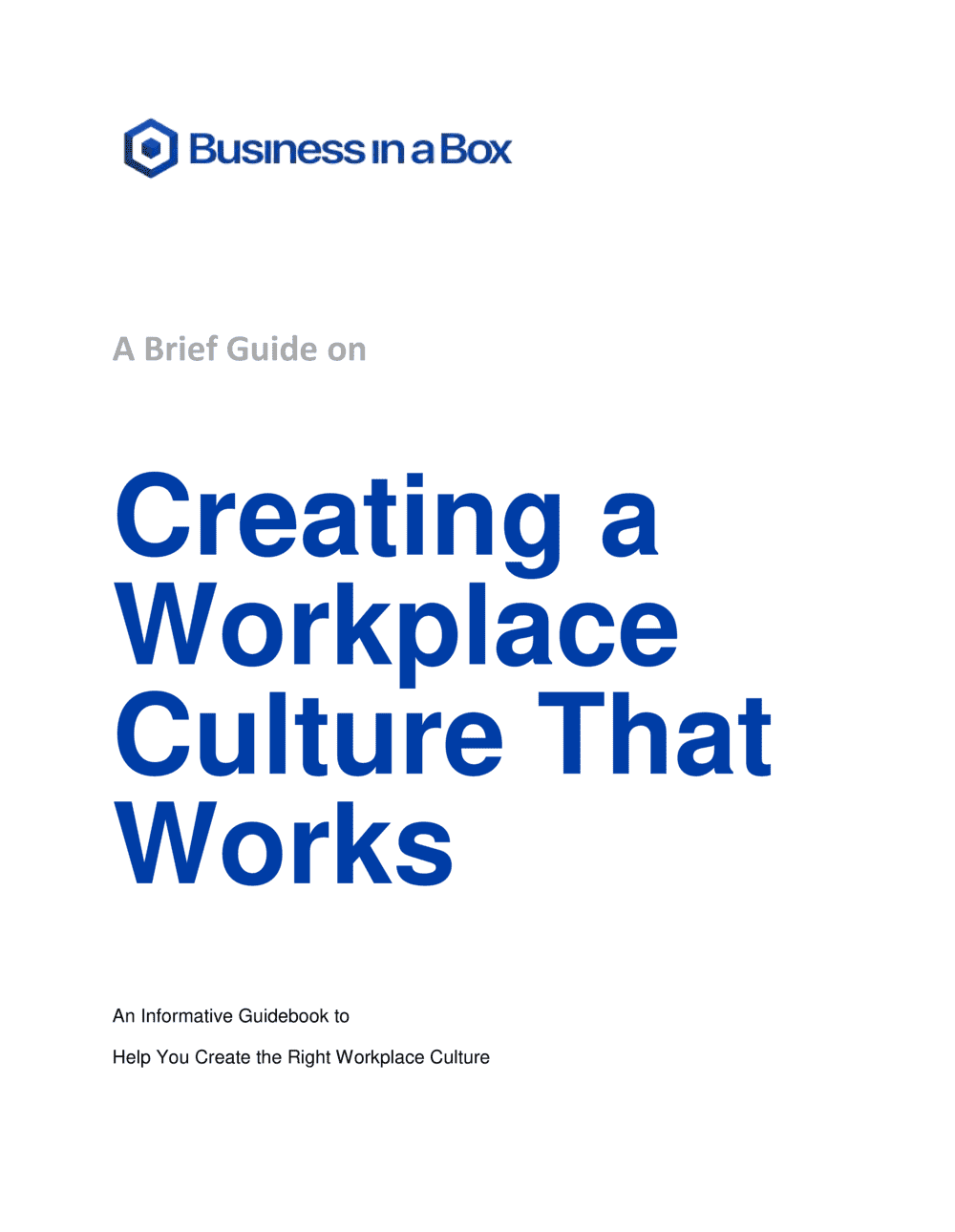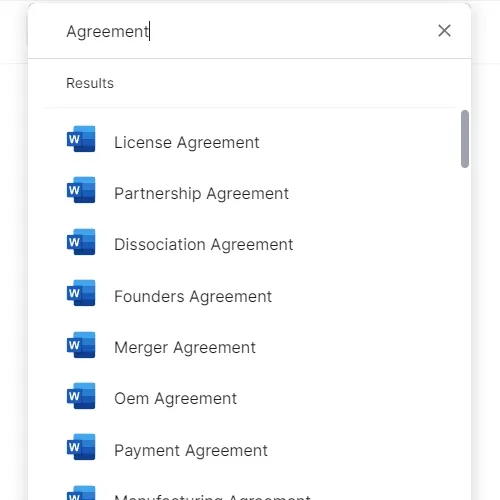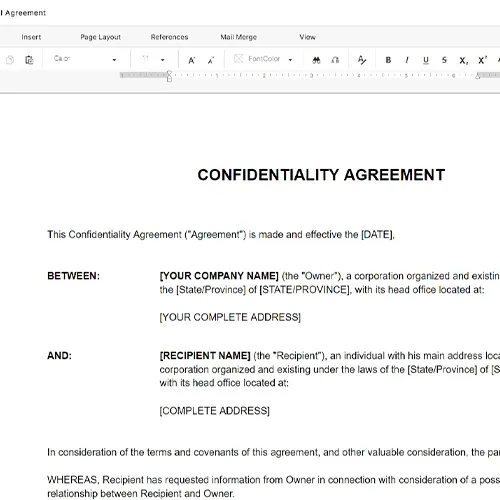Creating A Workplace Culture That Works Guide

Sample of Document Content
This creating a workplace culture that works guide template has 14 pages and is a MS Word file type listed under our human resources documents.
Creating a workplace culture that works guide
A Brief Guide on Creating a Workplace Culture That Works An Informative Guidebook to Help You Create the Right Workplace Culture Table of Contents Introduction to Workplace Culture 2 The Benefits of Having a Winning Workplace Culture 3 A Starting Point for Your Company Culture 5 Building a Culture 8 Common Types of Workplace Cultures 11 Conclusion 13 Introduction to Workplace Culture "Corporate culture is the only sustainable competitive advantage that is completely within the control of the entrepreneur. develop a strong corporate culture first and foremost." - David Cummings, Co-Founder of Pardot Team building is the strategic process that refers to the actions and tactics that management of a business considers transforming a group of people into a professional, skilled and cohesive team. Effective teams enhance the overall growth and productivity of a firm. Team-building activities enable management to develop a viable relationship with employees and creates stronger bonds among the individuals present in a group. This ultimately motivates them to work collaboratively to achieve common organizational goals. Organizational leaders that focus on effective team building are more likely to achieve successful completion of projects, better performance and improved morale of their employees. The Benefits of Having a Winning Workplace Culture What does a good culture mean for your company? This question is often asked by new entrepreneurs. But remember, entrepreneurs don't think like employees, or they'd still be one. You might not need a culture. You might be content with a desk, computer, phone, and some peace and quiet. However, most of us aren't wired that way. We need a little more to be happy, inspired, and content. The benefits of a strong and positive workplace culture are well-documented: Less stress. A positive environment that is both safe and supportive results in a less-stressed employee. When people enjoy their work environment, they are more eager to get to work and to be at work. Less absenteeism. A pleasant and enjoyable workplace results in fewer people calling sick. Sick employees are getting paid without providing any value on that day. How many times have you called in sick just because you didn't want to go to work? Sick days are expensive for a company, especially a smaller one. Greater productivity. Lower absenteeism and a happy and inspired workforce get more work done. It's as simple as that. The more productive your employees are, the fewer of them you need. Greater productivity leads to lower costs and greater profits. Employee satisfaction. When employees like and respect their workplace culture, their overall satisfaction increases. Creativity. It's hard to be creative in an unpleasant environment. Creativity is the key to the success of any business. Whether it's developing exciting and innovative products and services or finding new ways to decrease costs, creativity is vital. Better teamwork. When everyone buys into the company culture, it's easier to work together. Teams can accomplish more than individual employees, so teamwork is essential to the long-term success of a company. Companies with inspiring workplace cultures have great teams and teamwork. Employee retention. Companies with highly rated cultures have significantly fewer employees jumping ship. Everyone that's had at least a couple of jobs knows the value of an enjoyable work experience. Better customer service. An engaged employee provides better customer service, particularly if the culture emphasizes the importance of customer relationships. Your company requires a definitive corporate environment once it grows beyond a few employees. There are many benefits to finding an effective culture for your company. Failing to establish a culture means that you're neglecting the above items. Can your business thrive that way? A Starting Point for Your Company Culture "If you are lucky enough to be someone's employer, then you have a moral obligation to make sure people do look forward to coming to work in the morning." - John Mackey, CEO of Whole Foods Market A good place to begin is by considering the common features found in many successful cultures. While your company is unique, the most effective culture for your workplace will likely share many of the same characteristics. Consider how you would address each of these items in your own company culture. A successful company culture requires several things: Clear core values. One thing all successful workplace cultures share is a set of core values that are perfectly clear to all employees. What will your company values be? There are a variety of things a company can emphasize. Innovation and creativity Home/work balance Aggressiveness Results Casual or not? Teamwork Respect. Respect is an important part of a workplace culture. This means respect between peers and between the highest-level employees and the lowest. Employees that feel disrespected quickly become disgruntled. The quality and quantity of their work suffers. Communication. Open communication within the company fosters greater success. Again, this means between peers and between the various levels of the organization. Have regular communication across all levels. Company-wide meetings can be very effective if logistically possible. Inclusivity. Significant separation between the upper level employees and the lower level employees has often been a source of friction. Establish a corporate culture that includes all employees from the CEO to the person that empties the garbage cans. The culture matches the business and the employees. Different cultures are suitable for different industries. Banking is a traditionally conservative business. It might be hard to make a culture of jeans and golf shirts work. A tech company would struggle to find the right employees if its culture were overly conservative. Can you imagine everyone at a tech startup wearing a suit to work? Or a tech company that doesn't value creativity and innovation? It's okay to be innovative and push the envelope. Just remember that the culture has to support your business type, clients, and employees. The culture needs to go from the top to the bottom. Everyone needs to be held to the same standards. In many companies, people look the other way when an executive fails to abide by the culture or rules of the company. This breeds dissent and anger. Employee recognition. Positive work cultures give employees recognition for their accomplishments above and beyond the norm. This can take the form of monetary awards, additional days off, lunch with the CEO, or even just mention in an email or company newsletter. Regardless of the size of your company, find a way to recognize an employee when they do something exceptional. Keep the employee's goals in mind. No employee has the dream of working in a cubicle for the rest of their lives. Your dream isn't their dream. It's important to find ways to help your employees progress forward in life. Every manager should know his employees' goals, whether it's to learn a new software program, move into a sales job, or become an executive down the road. Strong company cultures support employees in the pursuit of their goals. Employee feedback. Ask for and use employee feedback. You can't be everywhere at once, and you don't know the absolute best way to perform every job in your company. Your employees know things, and it would be wise to extract this information from them. Encourage your employees to provide regular feedback on all aspects of the company. Transparency. This goes back to communication. Be as transparent as possible. The old mentality of, "You don't need to know anything beyond what you need to know to do your job" is dead
Reviewed on

Sample of Document Content
This creating a workplace culture that works guide template has 14 pages and is a MS Word file type listed under our human resources documents.
Sample of our creating a workplace culture that works guide template:
A Brief Guide on Creating a Workplace Culture That Works An Informative Guidebook to Help You Create the Right Workplace Culture Table of Contents Introduction to Workplace Culture 2 The Benefits of Having a Winning Workplace Culture 3 A Starting Point for Your Company Culture 5 Building a Culture 8 Common Types of Workplace Cultures 11 Conclusion 13 Introduction to Workplace Culture "Corporate culture is the only sustainable competitive advantage that is completely within the control of the entrepreneur. develop a strong corporate culture first and foremost." - David Cummings, Co-Founder of Pardot Team building is the strategic process that refers to the actions and tactics that management of a business considers transforming a group of people into a professional, skilled and cohesive team. Effective teams enhance the overall growth and productivity of a firm. Team-building activities enable management to develop a viable relationship with employees and creates stronger bonds among the individuals present in a group. This ultimately motivates them to work collaboratively to achieve common organizational goals. Organizational leaders that focus on effective team building are more likely to achieve successful completion of projects, better performance and improved morale of their employees. The Benefits of Having a Winning Workplace Culture What does a good culture mean for your company? This question is often asked by new entrepreneurs. But remember, entrepreneurs don't think like employees, or they'd still be one. You might not need a culture. You might be content with a desk, computer, phone, and some peace and quiet. However, most of us aren't wired that way. We need a little more to be happy, inspired, and content. The benefits of a strong and positive workplace culture are well-documented: Less stress. A positive environment that is both safe and supportive results in a less-stressed employee. When people enjoy their work environment, they are more eager to get to work and to be at work. Less absenteeism. A pleasant and enjoyable workplace results in fewer people calling sick. Sick employees are getting paid without providing any value on that day. How many times have you called in sick just because you didn't want to go to work? Sick days are expensive for a company, especially a smaller one. Greater productivity. Lower absenteeism and a happy and inspired workforce get more work done. It's as simple as that. The more productive your employees are, the fewer of them you need. Greater productivity leads to lower costs and greater profits. Employee satisfaction. When employees like and respect their workplace culture, their overall satisfaction increases. Creativity. It's hard to be creative in an unpleasant environment. Creativity is the key to the success of any business. Whether it's developing exciting and innovative products and services or finding new ways to decrease costs, creativity is vital. Better teamwork. When everyone buys into the company culture, it's easier to work together. Teams can accomplish more than individual employees, so teamwork is essential to the long-term success of a company. Companies with inspiring workplace cultures have great teams and teamwork. Employee retention. Companies with highly rated cultures have significantly fewer employees jumping ship. Everyone that's had at least a couple of jobs knows the value of an enjoyable work experience. Better customer service. An engaged employee provides better customer service, particularly if the culture emphasizes the importance of customer relationships. Your company requires a definitive corporate environment once it grows beyond a few employees. There are many benefits to finding an effective culture for your company. Failing to establish a culture means that you're neglecting the above items. Can your business thrive that way? A Starting Point for Your Company Culture "If you are lucky enough to be someone's employer, then you have a moral obligation to make sure people do look forward to coming to work in the morning." - John Mackey, CEO of Whole Foods Market A good place to begin is by considering the common features found in many successful cultures. While your company is unique, the most effective culture for your workplace will likely share many of the same characteristics. Consider how you would address each of these items in your own company culture. A successful company culture requires several things: Clear core values. One thing all successful workplace cultures share is a set of core values that are perfectly clear to all employees. What will your company values be? There are a variety of things a company can emphasize. Innovation and creativity Home/work balance Aggressiveness Results Casual or not? Teamwork Respect. Respect is an important part of a workplace culture. This means respect between peers and between the highest-level employees and the lowest. Employees that feel disrespected quickly become disgruntled. The quality and quantity of their work suffers. Communication. Open communication within the company fosters greater success. Again, this means between peers and between the various levels of the organization. Have regular communication across all levels. Company-wide meetings can be very effective if logistically possible. Inclusivity. Significant separation between the upper level employees and the lower level employees has often been a source of friction. Establish a corporate culture that includes all employees from the CEO to the person that empties the garbage cans. The culture matches the business and the employees. Different cultures are suitable for different industries. Banking is a traditionally conservative business. It might be hard to make a culture of jeans and golf shirts work. A tech company would struggle to find the right employees if its culture were overly conservative. Can you imagine everyone at a tech startup wearing a suit to work? Or a tech company that doesn't value creativity and innovation? It's okay to be innovative and push the envelope. Just remember that the culture has to support your business type, clients, and employees. The culture needs to go from the top to the bottom. Everyone needs to be held to the same standards. In many companies, people look the other way when an executive fails to abide by the culture or rules of the company. This breeds dissent and anger. Employee recognition. Positive work cultures give employees recognition for their accomplishments above and beyond the norm. This can take the form of monetary awards, additional days off, lunch with the CEO, or even just mention in an email or company newsletter. Regardless of the size of your company, find a way to recognize an employee when they do something exceptional. Keep the employee's goals in mind. No employee has the dream of working in a cubicle for the rest of their lives. Your dream isn't their dream. It's important to find ways to help your employees progress forward in life. Every manager should know his employees' goals, whether it's to learn a new software program, move into a sales job, or become an executive down the road. Strong company cultures support employees in the pursuit of their goals. Employee feedback. Ask for and use employee feedback. You can't be everywhere at once, and you don't know the absolute best way to perform every job in your company. Your employees know things, and it would be wise to extract this information from them. Encourage your employees to provide regular feedback on all aspects of the company. Transparency. This goes back to communication. Be as transparent as possible. The old mentality of, "You don't need to know anything beyond what you need to know to do your job" is dead
Easily Create Any Business Document You Need in Minutes.

Download or open template
Access over 3,000+ business and legal templates for any business task, project or initiative.

Edit and fill in the blanks
Customize your ready-made business document template and save it in the cloud.

Save, Share, Export, or Sign
Share your files and folders with your team. Create a space of seamless collaboration.


